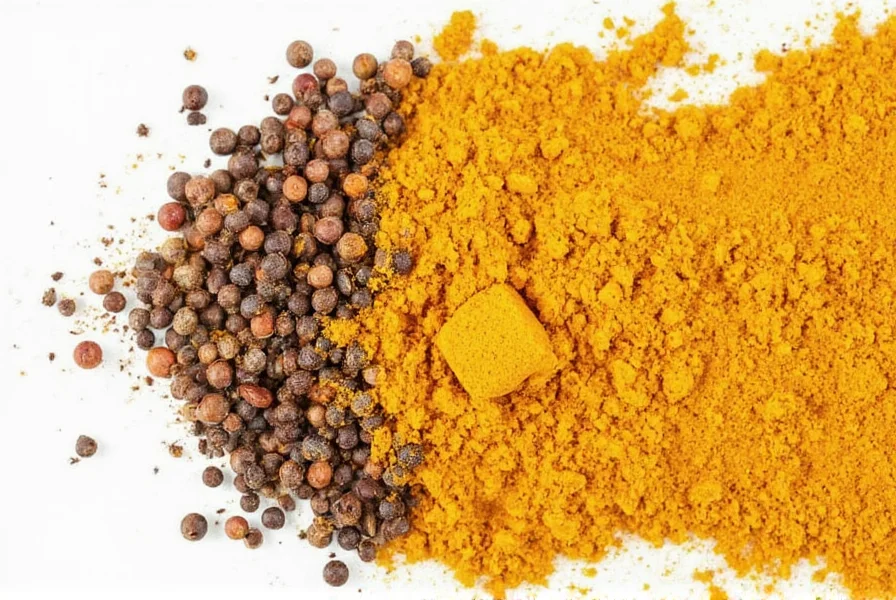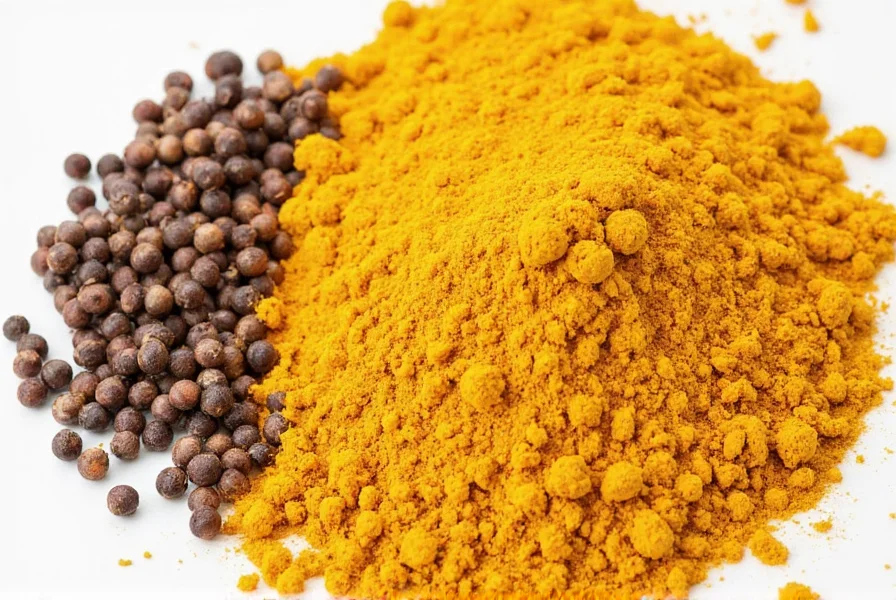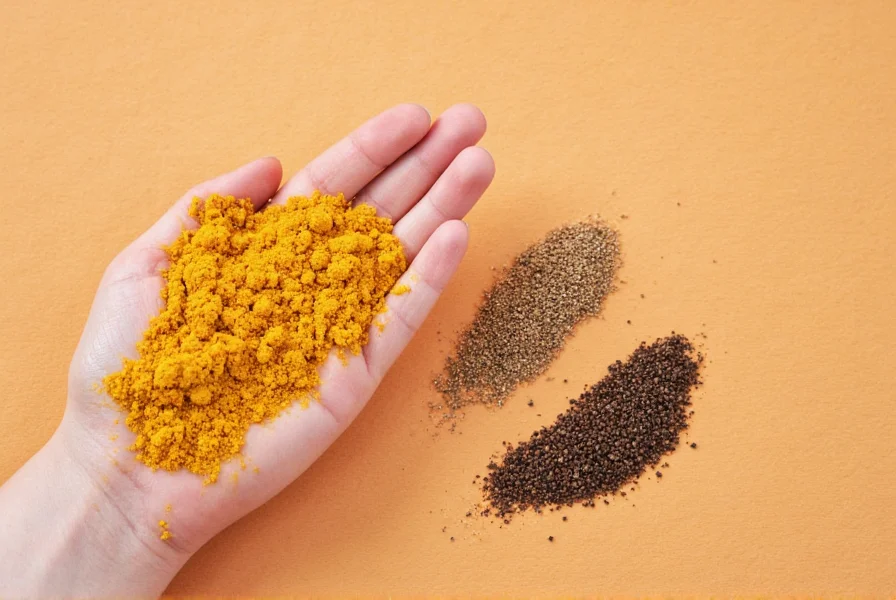Black pepper significantly enhances the bioavailability of curcumin, turmeric's active compound, by up to 2,000%. This occurs because piperine in black pepper inhibits liver enzymes that metabolize curcumin and improves intestinal absorption, making the health benefits of turmeric substantially more effective when consumed together.
Many people miss out on turmeric's full potential simply because they're not pairing it correctly with black pepper. This powerful culinary duo isn't just traditional wisdom—it's backed by solid scientific evidence. Understanding the precise mechanism behind this synergy can transform how you incorporate these spices into your daily routine for maximum health benefits.
The Bioavailability Challenge of Turmeric
Turmeric contains curcumin, a polyphenol responsible for most of its studied health benefits. However, curcumin faces significant bioavailability challenges. When consumed alone, curcumin has poor absorption, rapid metabolism, and quick systemic elimination. Research shows that even high doses of curcumin alone result in minimal blood concentration.
A landmark study published in Planta Medica demonstrated that when 20mg of piperine (the active compound in black pepper) was combined with 2g of curcumin, the bioavailability of curcumin increased by 2,000%. This dramatic improvement explains why traditional Ayurvedic and Chinese medicine systems have long combined these spices.
| Curcumin Consumption Method | Bioavailability Increase | Key Research Findings |
|---|---|---|
| Curcumin alone | Baseline (1x) | Rapid metabolism, low blood concentration |
| Curcumin with piperine | Up to 20x (2,000%) | Significantly higher blood levels maintained longer |
| Curcumin with fats | 2-7x | Moderate improvement through fat solubility |
| Curcumin with both piperine and fats | Up to 25x | Optimal absorption strategy for maximum benefits |
How the Turmeric and Black Pepper Combination Works
The science behind turmeric and black pepper benefits centers on piperine's dual action. First, piperine inhibits certain liver and intestinal enzymes (specifically UDP-glucuronidase) that break down curcumin before it can be absorbed. Second, piperine enhances intestinal permeability, allowing more curcumin to enter the bloodstream.
This mechanism explains why the traditional practice of adding black pepper to turmeric-based remedies isn't just folklore—it's pharmacologically sound. The combination creates what researchers call a "bioenhancer" effect, making otherwise poorly absorbed compounds significantly more available to the body.

Evidence-Based Health Benefits of the Combination
When properly combined, turmeric and black pepper offer several evidence-supported benefits:
- Enhanced anti-inflammatory effects: The increased curcumin bioavailability leads to more effective reduction of inflammatory markers like NF-kB and cytokines
- Improved antioxidant capacity: Higher blood levels of curcumin provide stronger protection against oxidative stress
- Better joint health support: Clinical studies show greater improvement in arthritis symptoms when curcumin is combined with piperine
- Increased cognitive benefits: Research suggests the combination may more effectively cross the blood-brain barrier
It's crucial to note that while promising, many studies use concentrated curcumin extracts rather than culinary amounts. The health benefits of turmeric and black pepper in everyday cooking are more modest but still significant when consumed consistently as part of a balanced diet.
Practical Guidelines for Maximum Benefit
Understanding how black pepper increases turmeric absorption helps optimize your consumption:
- Ratio matters: Use approximately 1/4 teaspoon of black pepper for every teaspoon of turmeric
- Heat activation: Lightly heating turmeric in oil or fat before adding black pepper enhances solubility
- Timing: Consume the combination with meals containing healthy fats for optimal absorption
- Freshness: Whole peppercorns retain piperine longer than pre-ground pepper—grind fresh when possible
The best way to consume turmeric with black pepper is in cooked dishes rather than raw preparations. Try adding both to soups, stews, roasted vegetables, or golden milk recipes. For those using supplements, look for products that specifically include piperine or follow the same ratio in your cooking.

Important Considerations and Limitations
While the scientific evidence for turmeric black pepper combination is compelling, several important considerations exist:
- The dramatic 2,000% increase refers to blood concentration levels, not necessarily a 20-fold increase in health effects
- Most human studies use concentrated curcumin extracts (typically 500-2,000mg), not culinary amounts
- Individual responses vary based on metabolism, gut health, and other dietary factors
- People on certain medications (particularly blood thinners) should consult healthcare providers before consuming large amounts
It's also important to recognize what the research doesn't support. Turmeric and black pepper are not miracle cures for serious diseases. While they offer valuable anti-inflammatory and antioxidant properties, they work best as part of a comprehensive healthy lifestyle rather than standalone treatments for medical conditions.
Conclusion
The turmeric and black pepper benefits extend far beyond traditional culinary pairing—they represent a scientifically validated approach to enhancing nutrient absorption. By understanding the precise mechanism of how black pepper increases turmeric absorption, you can make informed decisions about incorporating this powerful combination into your diet. Remember that consistency matters more than single large doses, and the best results come from regular, moderate consumption as part of a balanced diet.











 浙公网安备
33010002000092号
浙公网安备
33010002000092号 浙B2-20120091-4
浙B2-20120091-4